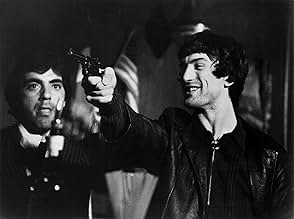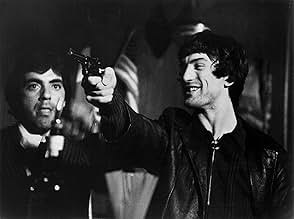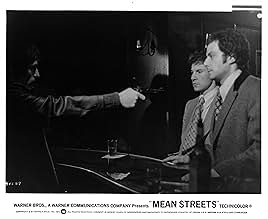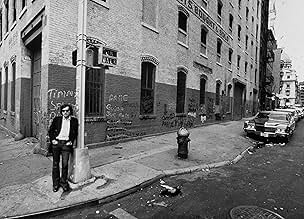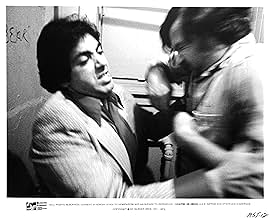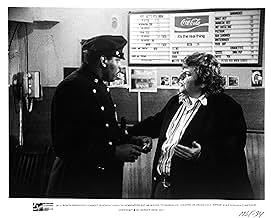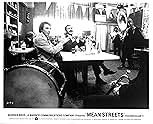Un delinquente da quattro soldi aspira a farsi strada nell'organizzazione criminale locale.Un delinquente da quattro soldi aspira a farsi strada nell'organizzazione criminale locale.Un delinquente da quattro soldi aspira a farsi strada nell'organizzazione criminale locale.
- Regia
- Sceneggiatura
- Star
- Premi
- 5 vittorie e 5 candidature totali
Victor Argo
- Mario
- (as Vic Argo, Victor Argo)
Murray Moston
- Oscar
- (as Murray Mosten)
Recensioni in evidenza
How can you endlessly watch a total screw-up borrow from the mob, annoy the only friend he has, and basically wreck his life without wanting to run away from it all? When the screw-up is played by young Robert DeNiro you are fascinated, you don't want to turn away. MEAN STREETS was not the debut of both Martin Scorcese or his stars Harvey Kietel and Robert deNiro. They struggled in the field for some time. This is the film that told the world, new head-honchos have arrived on the screen! MEAN STREETS tells of low-rent street hoods in Little Italy. Harvey Kietel plays the one hood whose a voice of reason, who doesn't mess up all the time, who is smart enough to avoid trouble. When DeNiro's Johnny Boy is first seen here, he is playing infantile tricks, and is telling his friend how he can't go in half the stores around him because he owes everybody money. Martin Scorcese uses a gritty documentary-shooting style to unfold his movie. It remains probably the best film of 1973 (But 1973 was not one of the best years for movies.)
'Mean Streets', the earliest Scorsese film people have heard of, is the result of an on-form film maker, telling a personal story.
One thing to immediately note about 'Mean Streets' is the performance of our two leads, Harvey Keitel and Robert De Niro, both looking young and are full of energy. They deliver the goods, big time. They are both so watchable and make up at least half of the movie's appeal. In fact, 'Mean Streets' is an inherently watchable movie overall, helped by some fine dialogue and Scorsese's trademark energetic and involving camera-work. The main draw is the antics of the characters and their relationships rather than a high-stakes narrative. Dramatic things happen but don't relate intrinsically to the central plot: that of De Niro's character Johnny Boy, his debts to clubs, bars and old pals along with his long-suffering buddy Charlie (Keitel).
In comparison to other Scorsese films (which is inevitably going to happen if this is not your first Scorsese), it is very low on scale and as mentioned before, low on stakes. This is no gangster epic or psychological portrait but simply a 2 hour window into the streets of New York. It is certainly worth watching.
One thing to immediately note about 'Mean Streets' is the performance of our two leads, Harvey Keitel and Robert De Niro, both looking young and are full of energy. They deliver the goods, big time. They are both so watchable and make up at least half of the movie's appeal. In fact, 'Mean Streets' is an inherently watchable movie overall, helped by some fine dialogue and Scorsese's trademark energetic and involving camera-work. The main draw is the antics of the characters and their relationships rather than a high-stakes narrative. Dramatic things happen but don't relate intrinsically to the central plot: that of De Niro's character Johnny Boy, his debts to clubs, bars and old pals along with his long-suffering buddy Charlie (Keitel).
In comparison to other Scorsese films (which is inevitably going to happen if this is not your first Scorsese), it is very low on scale and as mentioned before, low on stakes. This is no gangster epic or psychological portrait but simply a 2 hour window into the streets of New York. It is certainly worth watching.
Both Robert De Niro and Harvey Keitel are fantastic in Mean streets. I'm not a huge Robert De Niro fan as every time i see him act, i just think to myself that he Robert De Niro trying to be somebody. This is not the case in mean Streets for me. Instead he plays a kid who is young and stupid named Johnny boy. His performance is brilliant and is most likely one of his best. Keitel plays Charlie who looks out for Johhny. The opening line of the film basically tells you everything you would want to know about Charlie.
The film is gritty and shot in a documentary style with several tracking shots being carried out hand held. It takes the film 45 minutes to give you a clear plot and a clear understanding on what going to unfold. The last 20 minutes is directed perfectly with a palpable sense of suspense and is clearly the best ending you can give to this film. One negative would be that in the first half there literally no set pieces . Not a lot happens but saying this you get a clear understanding and fully engaged with the characters which makes the last 20 minutes outstanding.
It not the best film that Scorese has ever made but it clear by watching this that Mean Streets was his main starting point to his successful career
The film is gritty and shot in a documentary style with several tracking shots being carried out hand held. It takes the film 45 minutes to give you a clear plot and a clear understanding on what going to unfold. The last 20 minutes is directed perfectly with a palpable sense of suspense and is clearly the best ending you can give to this film. One negative would be that in the first half there literally no set pieces . Not a lot happens but saying this you get a clear understanding and fully engaged with the characters which makes the last 20 minutes outstanding.
It not the best film that Scorese has ever made but it clear by watching this that Mean Streets was his main starting point to his successful career
The first time that Robert De Niro appears up-close in Martin Scorsese's Mean Streets is to the tune of the Rolling Stones' Jumpin' Jack Flash. It's from this point forward that the movie leaves the realm of being a 'good film' and becomes 'one of the greatest films of all time.' Simply put, the energy of Mean Streets is fantastic. De Niro's flamboyant entrance is one of many iconic moments in the film, which has influenced just about every crime film made since for good reason.
And yet ironically Mean Streets is rarely acknowledged as the masterpiece that it is, perhaps because a number of people actually forget about it. Everyone remembers Taxi Driver, Raging Bull and GoodFellas in particular, but Scorsese's breakthrough remains one of his most important and honest pieces of work, given little recognition apart from the praise by movie critics who do remember it.
Harvey Keitel, giving one of his most realistic and three-dimensional performances of all-time, plays the lonely and worried Charlie, a 20-something New York City Catholic who is haunted by his friend, Johnny Boy (De Niro), the local loner who has to jump off the sides of streets in order to dodge the local Mafia thugs he owes money to.
Mean Streets has been accused of lacking a point, and one critic calls it 'too real,' but I'd take this over most recent films any day of the week. Mean Streets doesn't have a dynamic arc like most motion pictures do sure, there's the rising action leading up to the climax, but it doesn't move from one frame to another trying to figure out the easiest way to end the movie while managing to stress all its points in such a manner so blatant that a four-year-old could pick up the themes.
It respects its audience enough to study its characters in such a way that they are given ten times as much depth as those seen in modern films released through Hollywood. As Johnny Boy, De Niro paints the ultimate portrait of a typical street loner a dumb kid who 'borrows money from everyone and never pays them back.' Charlie, much smarter and wiser, takes Johnny under his wing and tries to help him get a job, so that he can pay back what he owes to a local kingpin. However, Johnny is so irresponsible and stupid that he doesn't show up for work and begins fighting with the mob leading up to an inescapable conclusion that features some very ancient themes colliding together. It's the classic tale of redemption and escaping one's past, and if the film has a point it is that some people can't change and you'll get what's coming to you, even if you've got other people helping you out.
The film does have its technical flaws, such as poor dubbing, inconsistency, and the occasional goof. It's a raw movie, filmed on a low budget by a young and far more naïve Martin Scorsese. But all his typical elements are in place, to be expanded upon later in his career.
Keitel and De Niro are superb, particularly De Niro who shows great range very early on in his career. Almost unrecognizable in shabby clothing, hats and a scrawny figure to boot, this is a role that would typically be more suitable for Christopher Walken or other charismatic character actors but De Niro pulls off the role with intense talent, proving once again that he can handle any type of role. He's known for his psychotic roles, but in Mean Streets, he plays the opposite of Travis Bickle. Johnny Boy isn't unstable or psychopathic he's just wild and stupid.
Keitel channels all the thoughtful consciousness of an older child, considering Johnny Boy to be a brother of sorts. He feels that if he fails Johnny, he will somehow fail himself.
Mean Streets is a careful character study that never resorts to cardboard cutout caricatures or the standard clichés of the genre. Dialogue does not exist to move action forward towards the next adrenaline-packed sequence; Mean Streets focuses on its inhabitants with such strong emotional power that it's impossible not to be caught up in its grasp. A true classic from start to finish, and undeniably a very moving film.
And yet ironically Mean Streets is rarely acknowledged as the masterpiece that it is, perhaps because a number of people actually forget about it. Everyone remembers Taxi Driver, Raging Bull and GoodFellas in particular, but Scorsese's breakthrough remains one of his most important and honest pieces of work, given little recognition apart from the praise by movie critics who do remember it.
Harvey Keitel, giving one of his most realistic and three-dimensional performances of all-time, plays the lonely and worried Charlie, a 20-something New York City Catholic who is haunted by his friend, Johnny Boy (De Niro), the local loner who has to jump off the sides of streets in order to dodge the local Mafia thugs he owes money to.
Mean Streets has been accused of lacking a point, and one critic calls it 'too real,' but I'd take this over most recent films any day of the week. Mean Streets doesn't have a dynamic arc like most motion pictures do sure, there's the rising action leading up to the climax, but it doesn't move from one frame to another trying to figure out the easiest way to end the movie while managing to stress all its points in such a manner so blatant that a four-year-old could pick up the themes.
It respects its audience enough to study its characters in such a way that they are given ten times as much depth as those seen in modern films released through Hollywood. As Johnny Boy, De Niro paints the ultimate portrait of a typical street loner a dumb kid who 'borrows money from everyone and never pays them back.' Charlie, much smarter and wiser, takes Johnny under his wing and tries to help him get a job, so that he can pay back what he owes to a local kingpin. However, Johnny is so irresponsible and stupid that he doesn't show up for work and begins fighting with the mob leading up to an inescapable conclusion that features some very ancient themes colliding together. It's the classic tale of redemption and escaping one's past, and if the film has a point it is that some people can't change and you'll get what's coming to you, even if you've got other people helping you out.
The film does have its technical flaws, such as poor dubbing, inconsistency, and the occasional goof. It's a raw movie, filmed on a low budget by a young and far more naïve Martin Scorsese. But all his typical elements are in place, to be expanded upon later in his career.
Keitel and De Niro are superb, particularly De Niro who shows great range very early on in his career. Almost unrecognizable in shabby clothing, hats and a scrawny figure to boot, this is a role that would typically be more suitable for Christopher Walken or other charismatic character actors but De Niro pulls off the role with intense talent, proving once again that he can handle any type of role. He's known for his psychotic roles, but in Mean Streets, he plays the opposite of Travis Bickle. Johnny Boy isn't unstable or psychopathic he's just wild and stupid.
Keitel channels all the thoughtful consciousness of an older child, considering Johnny Boy to be a brother of sorts. He feels that if he fails Johnny, he will somehow fail himself.
Mean Streets is a careful character study that never resorts to cardboard cutout caricatures or the standard clichés of the genre. Dialogue does not exist to move action forward towards the next adrenaline-packed sequence; Mean Streets focuses on its inhabitants with such strong emotional power that it's impossible not to be caught up in its grasp. A true classic from start to finish, and undeniably a very moving film.
Like the Irishman long after it, Mean Streets is a gangster film that hones in on the mundanity of it all. The violence is pretty nasty when it happens but for the most part, focusing on the everyday life of these low level gangsters and their struggles in recognisably Scorsese fashion is this film's greatest strength.
Harvey Keitel leads the film with an inner turmoil that's great to witness. Overall, it's a very restrained performance which works so well since he's repressing all of his troubles. Seeing Robert De Niro in a role like this really shows how far he's come as this volatile and juvenile performance is almost unrecognizably him.
As director, co-writer and co-editor, Martin Scorsese has a fully formed vision. His usual themes are present, the editing mostly has the rhythm of his later work and New York is definitely a character in itself. Another signature trait of his work are the needle drops and there's a terrific selection of them on display in this.
Harvey Keitel leads the film with an inner turmoil that's great to witness. Overall, it's a very restrained performance which works so well since he's repressing all of his troubles. Seeing Robert De Niro in a role like this really shows how far he's come as this volatile and juvenile performance is almost unrecognizably him.
As director, co-writer and co-editor, Martin Scorsese has a fully formed vision. His usual themes are present, the editing mostly has the rhythm of his later work and New York is definitely a character in itself. Another signature trait of his work are the needle drops and there's a terrific selection of them on display in this.
What Scorsese Film Ranks Highest on IMDb?
What Scorsese Film Ranks Highest on IMDb?
Cinema legend Martin Scorsese has directed some of the most acclaimed films of all time. See how IMDb users rank all of his feature films as director.
Lo sapevi?
- QuizFrancis Ford Coppola contributed money to the budget of the film. However, it is rumored that he lent Martin Scorsese $3000 as the Mafia shook him down for using the San Genaro Festival as a backdrop without "permission". It's generally presumed the Mafia uses the all-cash festival to launder money from their ill-gotten gains.
- BlooperYou can see Robert De Niro's mic pack on his back when he gets up to walk to the window at Charlie's house after staying the night.
- Citazioni
[first lines]
Voice in Charlie's Mind: You don't make up for your sins in church. You do it in the streets. You do it at home. The rest is bullshit, and you know it.
- Versioni alternativeNBC edited 10 minutes from this film for its 1977 network television premiere.
- ConnessioniEdited into American Cinema: Film Noir (1995)
- Colonne sonoreJumpin' Jack Flash
Written by Mick Jagger (as M. Jagger), Keith Richards (as K. Richards) (uncredited)
By The Rolling Stones
Courtesy of ABKCO Records
I più visti
Accedi per valutare e creare un elenco di titoli salvati per ottenere consigli personalizzati
- How long is Mean Streets?Powered by Alexa
Dettagli
- Data di uscita
- Paese di origine
- Sito ufficiale
- Lingue
- Celebre anche come
- Calles peligrosas
- Luoghi delle riprese
- Aziende produttrici
- Vedi altri crediti dell’azienda su IMDbPro
Botteghino
- Budget
- 500.000 USD (previsto)
- Lordo Stati Uniti e Canada
- 32.645 USD
- Fine settimana di apertura Stati Uniti e Canada
- 32.645 USD
- 15 mar 1998
- Lordo in tutto il mondo
- 61.676 USD
- Tempo di esecuzione1 ora 52 minuti
- Colore
- Proporzioni
- 1.85 : 1
Contribuisci a questa pagina
Suggerisci una modifica o aggiungi i contenuti mancanti

Divario superiore
What was the official certification given to Mean Streets - Domenica in chiesa, lunedì all'inferno (1973) in Japan?
Rispondi




